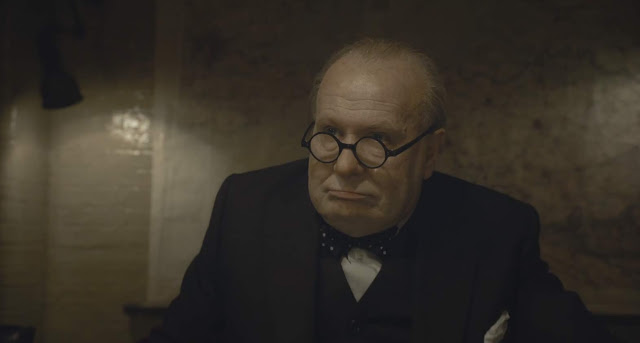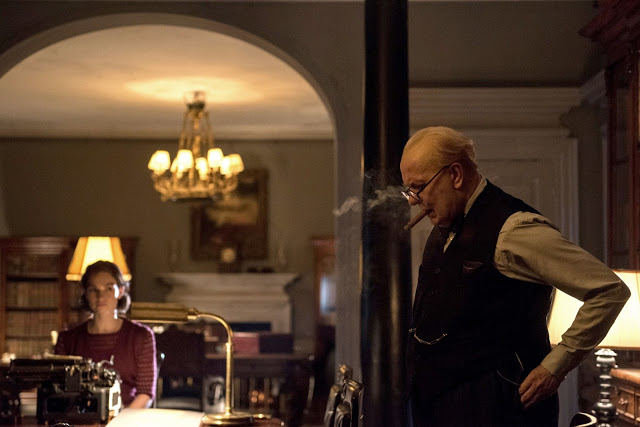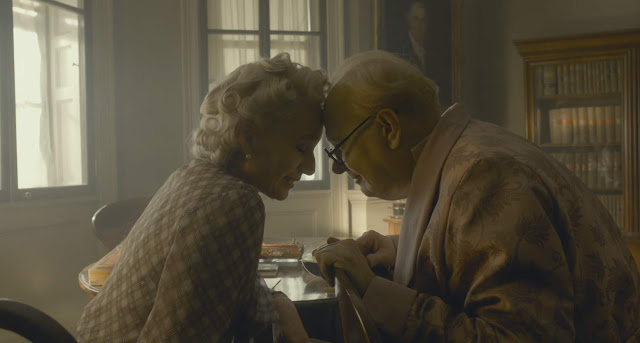Let us dispense immediately with the obvious and unfortunate comparison: Darkest Hour is no Dunkirk. It isn’t designed to be, of course; Joe Wright’s terse examination of Winston Churchill’s tumultuous ascension to Prime Minister is styled as an informative docudrama and a thoughtful character study, not an epic war film. Still, it’s rotten luck for Wright’s movie that it opened a mere four months after Christopher Nolan’s, given that the gap in intensity between the two films equates roughly to the length of the English Channel. It’s tempting to suggest pairing them as a double feature—after all, both chronicle the fateful events of Europe in May of 1940, albeit from opposite sides of the Channel—but in the wake of the pulverizing heroics of Dunkirk, the political brawls of Darkest Hour feel more like a palette cleanser, or maybe a sleeping pill.
Again, this (dis)similarity is not Darkest Hour’s fault. And while it’s unlikely to get anyone’s pulse racing, this modest movie sports its own elegant pleasures, chief among them affirmation of its director’s silky cinematic talents. Ever since his feature debut (the deeply underrated Pride & Prejudice), Wright has demonstrated a knack for wielding classical tools—camera placement, composition, lighting—in ways that feel invigorating rather than staid. His formidable abilities are again on display here, operating with a visual panache that does wonders to enliven his wobbly, predictable narrative. In Wright’s hands, shafts of sunlight and swirls of shadow become characters in their own right, turning every frame of the film into its own gorgeously told micro-story. There’s always something stunning to see on screen in Darkest Hour, even if you’re also invariably just watching crusty old men argue.
None of those men is manlier (or crustier) than Churchill, played by Gary Oldman in a performance that seems to have been systematically engineered to earn him an Oscar nomination. With prosthetic jowls and a snappish growl, his British Bulldog is a blustery, bellowing force, by turns indomitable statesman and irritable kook. It’s an astonishing physical transformation—it’s impossible to reconcile Oldman’s Churchill with George Smiley, the thin-lipped spook he played in Tinker Tailor Soldier Spy (to say nothing of the gaunt Sirius Black)—but it’s more notable for its impressive technical skill than for its genuine feeling.
That makes it a snug fit for Darkest Hour, which unfolds with a picturesque grandeur that helps camouflage its emotional vacuity. Spanning a rough month—“rough” both temporally and temperamentally—the film begins with Churchill supplanting the much-derided Neville Chamberlain (Ronald Pickup, replacing the late John Hurt) as Britain’s head of government. With Hitler turning mainland Europe into his own corpse-strewn backyard, Churchill refuses to negotiate—“You cannot reason with a tiger when your head is in its mouth!” he barks—drawing the ire of Chamberlain and Viscount Halifax (Stephen Dillane, smartly cast), who insist that suing Germany for peace is the only feasible solution. Convinced that Churchill’s obstinacy will ruin his standing in Parliament, these two wily schemers plot to spring a no-confidence vote, ousting the volatile warmonger from his post.
You don’t need to be familiar with basic 20th-century European history to know what happens next; a rudimentary knowledge of three-act cinema will suffice. Not that there’s anything especially wrong with Wright’s building-blocks approach to storytelling. His pacing is steady, his editing is on point, and his scope is appropriately narrow (the screenplay, by Anthony McCarten, avoids the typical biopic bloat that plagued his script for The Theory of Everything). But in recreating a particularly fraught period of world history, Darkest Hour never turns its participants into people. The movie’s token efforts to humanize Churchill—a handful of scenes with his affectionate wife (Kristin Scott Thomas), a senseless outsider’s POV in the form of an anxious typist (Lily James, appealing in a thin part)—all feel cursory, distractions from the brilliant leader’s righteous battle against his ineffectual, spineless, one-dimensional foes.
Yet for all its shrill simplicity, Darkest Hour is mostly an enjoyable experience, both for Wright’s consistently striking craftsmanship and for Oldman’s hammy performance, which the venerable actor clearly had a fun time delivering. Working with cinematographer Bruno Delbonnel (Inside Llewyn Davis, Harry Potter and the Half-Blood Prince), Wright turns the Palace of Westminster into a glorious amphitheater of verbal warfare, the crisscrossing beams of light illuminating the infuriated combatants with their pompous outrage and their stiff upper lips. And the movie’s two best scenes illustrate his verve and his patience, respectively. In one—the only time the film ventures to France—an army commander takes stock of his ravaged platoon, the camera gliding silently through their bloodied outpost before suddenly pulling up, up, up to give you a bomb’s-eye view of their imminent destruction. The other is a moment of shocking quiet, in which Churchill phones President Roosevelt (voiced by David Strathairn) and drops his signature bombast to make a hopeless plea for help.
The subtlety and gentle despair of that scene is largely foreign to Darkest Hour, which otherwise storms forward in bold, brash strides. That’s never more true than in a laughable late sequence on the Underground, in which the world’s most formidable political mind elects to have his strategy dictated to him by a carful of wise, oh-so-average Joes and Janes, including a learned man who can quote 19th-century poetry verbatim and a precious young girl with a startlingly firm grasp of military tactics.
That scene is ghastly, but it also illuminates the nostalgic appeal of Darkest Hour, a movie about a smart politician who makes shrewd decisions for the good of his people and the broader world. At the same time, it’s worth considering that nostalgia in the context of our current restive state. With the benefit of hindsight, we can safely say that Churchill was right, that appeasement was suicide, and that diplomacy was equivalent to surrender. We can say this, but as Americans, we must simultaneously acknowledge that our nation is currently being led by a deranged and bellicose commander-in-chief whose approximation of statesmanship is to boast about the size of his dick nuclear arsenal. So perhaps Darkest Hour is best viewed not as a work of historical fiction but as a piece of wish-fulfillment fantasy. It evokes a simpler and more enviable world: one where government is for the people, where the good guys are in charge, and where the screaming madman is still on the other side of the river.
Jeremy Beck is the editor-in-chief of MovieManifesto. He watches more movies and television than he probably should.




